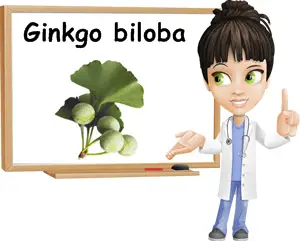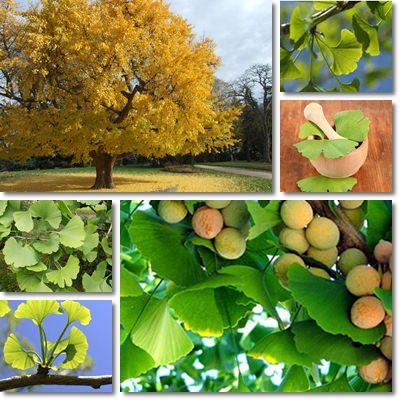Ginkgo biloba, also known as maidenhair or simply ginkgo, is a species of tree native to China but presently naturalized throughout the world. The fruits, seeds and especially leaves of the ginkgo tree are all valuable parts. While the meaty interior of the seeds is a popular delicacy in Asian cuisine, the leaves are used to make ginkgo biloba extracts and food supplements. Research on the properties and health effects of ginkgo biloba is conflicting at the very least.
Folk medicine as well as numerous scientific studies claim that ginkgo leaf and its derivate extract enhance cognition and may even reduce the risk of developing certain neurodegenerative mental diseases such as dementia or Alzheimer’s. At the same time, some studies suggest there are actually no real benefits to the plant as its health effects are too insignificant for us to even consider it as an alternative natural treatment.

What does Ginkgo biloba look like?
But before finding out who’s right and who’s not when it comes to its health effects, let’s first see what ginkgo biloba looks like. Ginkgo biloba is a large tree species reaching heights of up to 50 meters. Ginkgo trees generally have a tall, light gray-brown with ridges and furrows, light reddish branches and a large, irregular-branched crown. The older the tree, the thicker, more furrowed its trunk and the larger its crown.
Ginkgo biloba leaves, the source of the famous ginkgo biloba extracts, are light green and have a distinct, fan-like shape and wavy-like appearance, numerous parallel veins along the length of the leaf and generally two, sometimes three distinct lobes. In autumn, they turn yellow and fall to the ground.
Ginkgo biloba trees produce 1.5-2 cm long seeds covered in a thin, light yellow to brown, soft flesh. These fruit look a lot like small, yellow plums and are attached to branches by means of a long, thin stem. Removing the fleshy outer layer reveals the tiny, 1.5-2 cm long, elongated, pointy, brown, edible seeds. Seeds mature in late autumn, generally after the first frost and fall to the ground. The yellow fleshy exterior takes on a putrid smell due to its butyric acid content. Seeds have a hard, shell-like exterior containing the edible, meaty inside.
What do Ginkgo biloba nuts taste like?
The edible part of the ginkgo biloba fruit is the inside of the seed, a meaty, nut-flavored sort of pulp. The malodorous yellow flesh should not be consumed. Also, despite of their somewhat plum-like taste, ginkgo nuts retain part of the stinky cheese smell of the flesh.

What is Ginkgo biloba good for?
As mentioned above, research on the properties and health benefits of ginkgo biloba leaf and seeds extract and derivate food supplements is conflicting, with studies suggesting the extract has a beneficial action on the nervous system and supports overall cognition and more recent research revealing that it may not actually do much for our health. Moreover, scientists don’t know exactly how ginkgo biloba works, which adds to the confusion.
The purported uses of ginkgo biloba as revealed by research include:
- Better memory.
- Improved learning and thinking.
- Lower dementia and Alzheimer’s risks.
- Improved blood flow to the brain.
- Potential benefits for macular degeneration and glaucoma.
Ginkgo biloba is probably best known for is its ability to enhance cognition: learning, memory and thinking. Plant extracts have indeed been shown to improve blood flow, especially to the brain, hence the claims of their positive action on the nervous system. For this reason, extracts and dietary supplements made from ginkgo leaves and seeds are recommended for the following: memory problems, headaches, anxiety, blood circulation problems, learning problems, attention deficit, dementia, Alzheimer’s, etc.
Because of its ability to improve blood circulation, some studies suggest that ginkgo extract may help delay glaucoma onset and decline (Ginkgo biloba extract for age-related macular degeneration, 2013). Ginkgo biloba is also rich in polyphenols and flavonoids with strong antioxidant activity, hence its use for delaying macular degeneration (loss of central vision as a result of old age) onset and decline.
A great variety of scientific studies confirm a link between the consumption of various amounts of ginkgo biloba and improved cognition in both health individuals and Alzheimer’s and dementia sufferers (Ginkgo biloba extract and long-term cognitive decline: a 20-year follow-up population-based study), with recommended doses situating a little above 200 milligrams a day.
At the same time, there are studies which have found no link between use of ginkgo biloba extracts and improved memory and cognition. A more recent study has currently gained the attention of the medical community as it reveals no real connection between the use of ginkgo plant extracts and lower risks of dementia and Alzheimer’s in the elderly. 3, 069 individuals of age 75 or older have been given either a placebo or a 120 milligrams dose of ginkgo biloba extract twice a day and evaluated every 6 months over a period of more than 5 years.
The study authors concluded ginkgo supplementation with 120 milligrams of extract twice a day did not influence Alzheimer’s or dementia risks. Nevertheless, the results were valid for a certain dose of the extract, which does not necessarily exclude the potential health benefits of increasing ginkgo biloba intake for more visible results as far as memory and dementia risks are considered.
Opposing research: Ginkgo biloba for cognitive impairment and dementia.
The Ginkgo Evaluation of Memory (GEM) study: design and baseline data of a randomized trial of Ginkgo biloba extract in prevention of dementia.
However, just as some studies cannot find a clear connection between ginkgo biloba intake and improved cognition and other health benefits, others reveal that ginkgo intake works many people and brings about an improvement in cognition and overall nervous system health. For example, one study suggests there are valid reasons to use ginkgo biloba for enhancing mental function and general well-being in healthy individuals (Effects of Ginkgo biloba on mental functioning in healthy volunteers).
Considering that the majority of studies denying the effectiveness of ginkgo biloba extracts for nervous health admit their findings are limited to certain doses and study parameters, there might actually be benefits to the use of the plant extract for various disorders and diseases related to cognitive health and blood circulation. It is believed that the extract owes its health benefits to special compounds in the leaf and seeds, namely polyphenolic acids, flavonoid glycosides (kaempferol, myricetin, quercetin), terpenes, alkylphenols, biflavones, etc.
Other uses of Ginkgo biloba
Here is a list of other conditions ginkgo biloba is believed to help with:
- Cerebral insufficiency.
- Physical and mental fatigue.
- Depression and anxiety.
- Dizziness and headaches.
- Chronic venous insufficiency.
- Cognitive and physical performance.
- Multiple sclerosis, cognitive and vascular impairment.
However, keep in mind that more research is needed to confirm the benefits of taking ginkgo biloba for these conditions.
Potential side effects of Ginkgo biloba
Ginkgo biloba should be taken according to the recommendations of a medical professional and should not replace prescribed medication. While use at recommended doses has shown no side effects, improper use or overdosing can engender one of the following health issues:
- Increased risk of bleeding. Ginkgo biloba interferes with and may potentiate the effect of anticoagulant medication such as warfarin.
- Gastrointestinal problems (stomach upset, vomiting, nausea, diarrhea).
- Dizziness, palpitations, restlessness, headaches, insomnia.
- Allergic reactions caused by eating the yellow flesh (contains ginkgolic acids).
- Risk of bleeding in pregnant women.
Considerations
Talk to your doctor before resorting to any form of alternative or herbal treatment, especially if you are already being treated for something. This way you will avoid potentially dangerous side effects and medicine interactions. Ginkgo biloba is generally safe for use, but medical assistance is required for establishing proper dosage and use. Whether it good or bad for you, only you can tell, as no study can possibly predict individual responses to certain medicinal herbs and plants.
